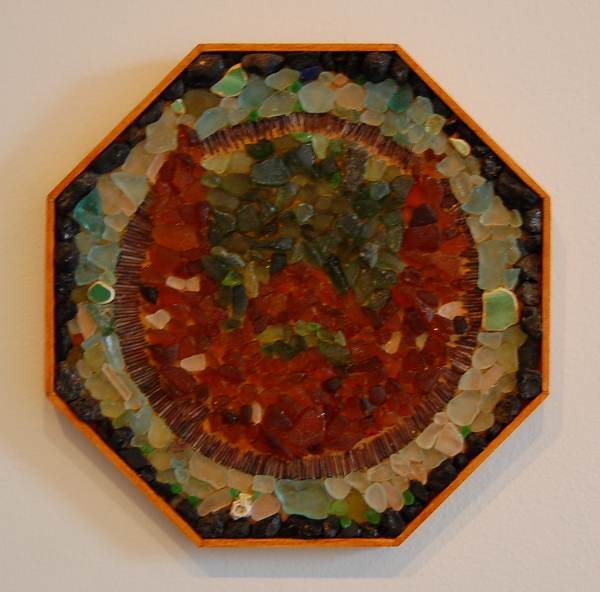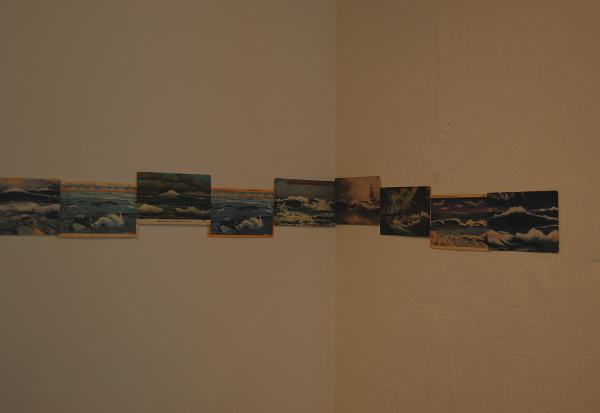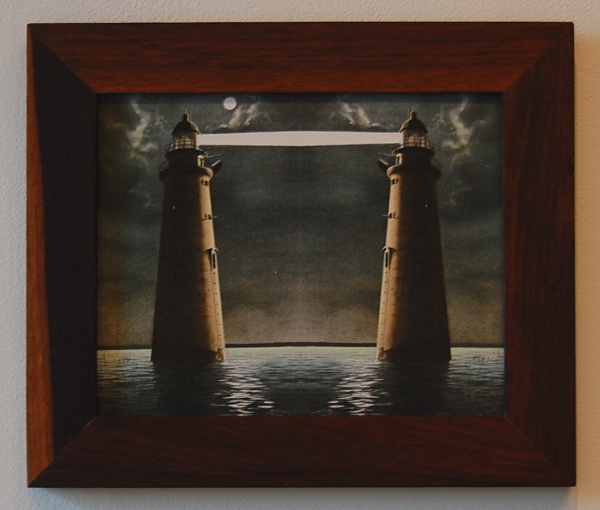
Tyler McPhee grasps at the vastness and longing of the sea
Looking at the distant horizon from shore, the mind has a tendency to wander amongst feelings of melancholy, ideas of immensity, and concepts of faraway places. What fertile ground for the romantic ruminations of human beings in the face of our magnificent planet! Whether the ocean is flat and serene, or viciously churning, it is clear that nature is far from involved in human affairs, and certainly not benevolent. At Napoleon, artist Tyler McPhee embarks on an expedition of longing and lore associated with the sea in his solo show “Perfect Lovers,” on display throughout July.
The exhibit as a whole is partially inspired by the fatal project of Bas Jan Ader entitled “In Search of the Miraculous,” on which Ader set out to sea and never returned. Setting out on the waves is always treacherous, whether a century ago or today, and regardless of maritime experience, there is a constant looming threat of being swallowed by the depths. By noting themes of intensity and raw human emotion present in Ader’s work, McPhee taps into this nearly ubiquitous – and more than appropriate – awe inherent in our perceptions of the mighty sea.
Some of McPhee’s material comes in the way of found objects, which he incorporates into works mostly through arrangement. In the case of “The Old Man in the Sea,” he places bits of sea glass into an octagonal pine frame, creating a mosaic of earthy and aquatic hues. There is no obvious face present like the more famous Man in the Moon, but the formerly hard-edged bits of weathered glass are now worn down and aged much like a face that has seen many years. Calling on Hemingway’s weary fisherman, McPhee composes a picture of time, erosion and humanity in one modest image forged mostly by the waves.
Tyler McPhee, “Oceans.”
Elsewhere, the artist lines a corner of the room with a wraparound row of vintage postcards depicting seascape illustrations. This tongue-in-cheek homage to mass-produced scenic views on paper offers little in the way of actual presence. Each card is merely a rendition of reality, and like the ‘wish you were here’ sentiment of postcards, they cheapen the true nature of experience, in this case ad nauseam. By condensing distance through correspondence and capturing earth’s open seas as mere portraits, McPhee does his best to semi-seriously imagine the horizon line of the ocean within the confines of the gallery. Unless we set out for ourselves in this life, McPhee seems to say to us, we’ll only be left with secondhand sights and recycled knowledge.
Tyler McPhee, “Perfect Lovers.”
For “Perfect Lovers,” the title piece of the show, longing and heartfelt notions of love and loss are explored by way of the mirror image of a lighthouse. Reflecting in such a way that the long beam of light from one structure feeds directly into that of the other, the two are locked in an eternal warning signal aimed at one another. Neither lighthouse is a seafaring vessel, so it seems simultaneously ludicrous and lovely that the two towers would eventually sync up in such a way. Neither one needs the light from the other, but as the print stands, they will never shine anywhere else. If these lighthouses somehow had a choice, personified as they are, they may not even bother to turn and signal elsewhere, dooming countless sailors in favor of this seamless serendipity.
Our globe is mostly inhospitable stretches of open ocean, so when we spend time considering our place on earth, we find ourselves submerged in the relative unknown – and that only represents this one tiny planet. Tyler McPhee reminds us of both the absurdity and the intrigue that come with contemplating or traveling the sea; a humbling romance that also presents a very real danger. By acknowledging Bas Jan Ader’s sacrifice in the search of art, pure emotion, and the farthest expanses of our world, “Perfect Lovers” provides us a fluid foundation for our own journeys.
Napoleon is located at 319 North 11th St., on the second floor, Philadelphia; [email protected]; napoleonnapoleon.com.
Recent Content
-
Artsarticle ·
-
Artsarticle ·
-
Artsarticle ·



